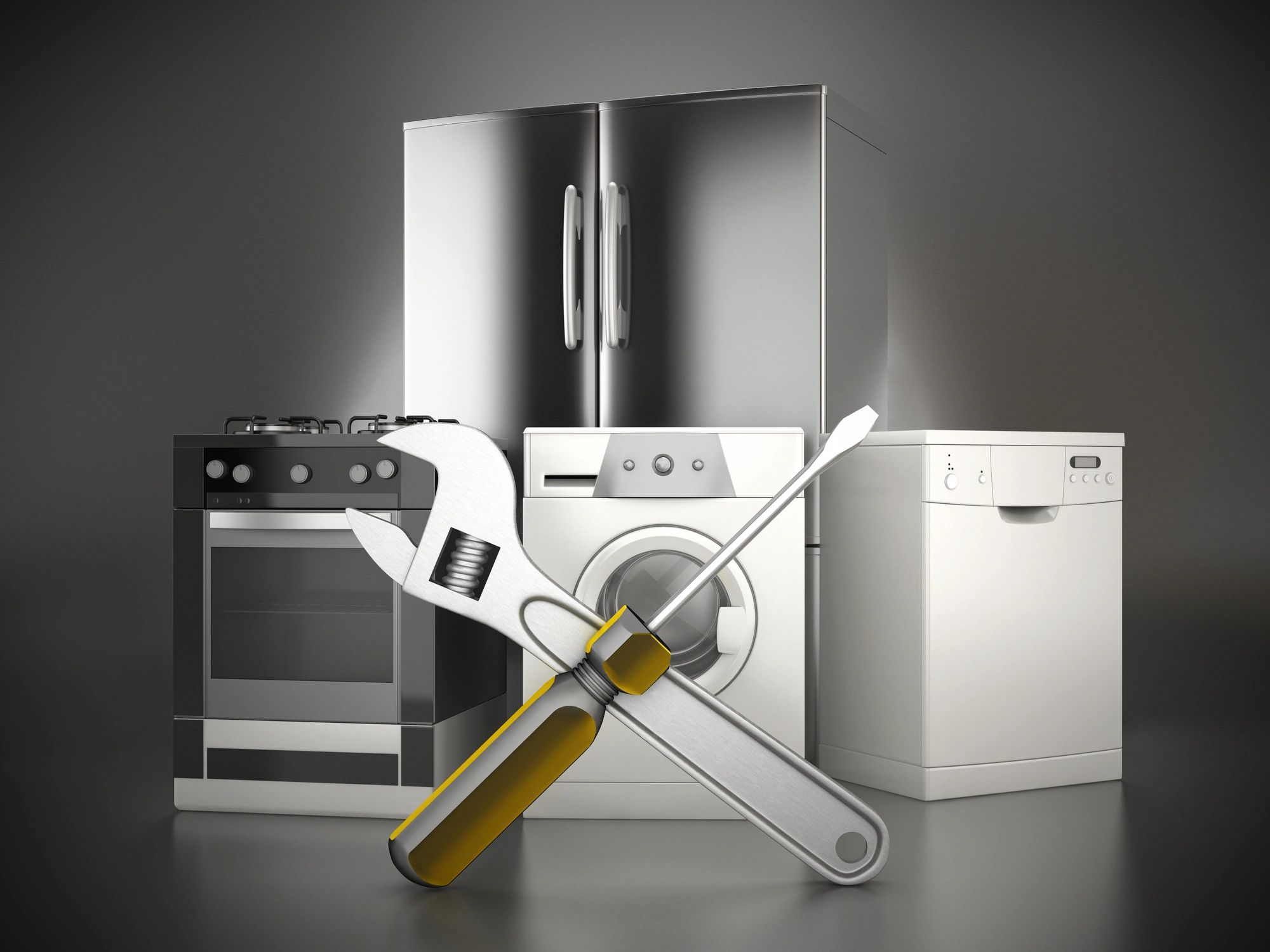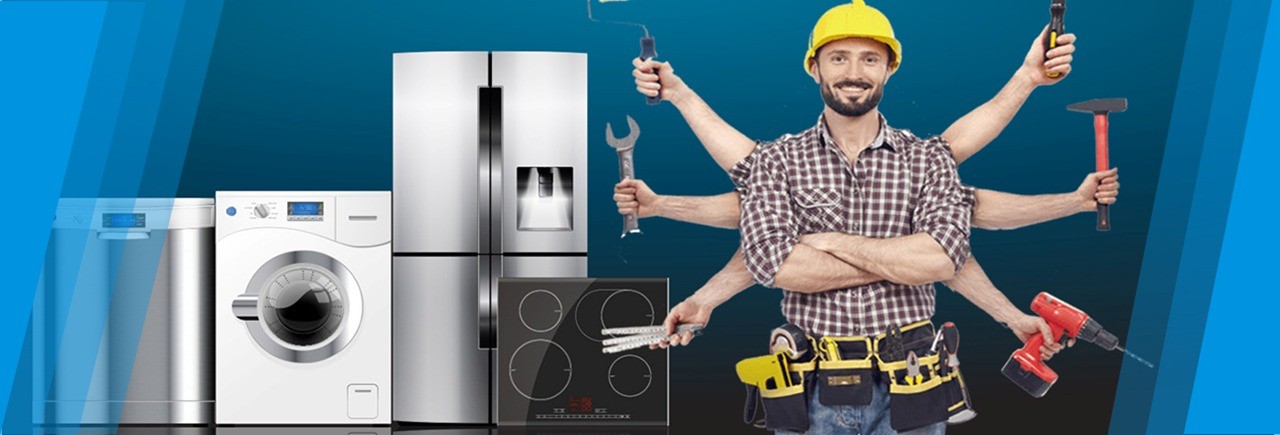Fixing Drainage Issues at Home – Washer dryer repair service Dependable Refrigeration
Fixing Drainage Issues at Home – Washer dryer repair service Dependable Refrigeration
Blog Article
The Ultimate Overview to Understanding Appliance Fixing in your home
When your refrigerator stops cooling or your stove refuses to heat, it can really feel overwhelming. Recognizing home appliance repair in the house can conserve you money and time. You'll find out to recognize symptoms, use crucial devices, and comply with a methodical troubleshooting process. Before you start, there are critical safety and security preventative measures you need to take right into account. What are one of the most typical troubles, and just how can you fix them? Let's check out the fundamentals.
Usual Device Problems and Their Signs
When your appliances start acting up, it's necessary to identify the indicators early on. Ignoring them can lead to bigger issues and pricey repairs. If your refrigerator isn't cooling down effectively, you might see warm spots or condensation forming. This might indicate a stopping working compressor or a blocked vent.Your dish washer might show issues with dirty dishes or unusual sounds during cycles. If you hear grinding or clanking, it's time to investigate.A cleaning maker that will not rotate or drain pipes can leave you with soaked washing, recommending a clogged drain or a malfunctioning pump.Lastly, if your stove's temperature level seems off or it takes forever to pre-heat, you may be taking care of a malfunctioning thermostat. By staying sharp to these signs and symptoms, you can deal with concerns prior to they rise right into significant fixings.
Vital Tools for Appliance Repair Work
When you're dealing with appliance repair services in the house, having the right tools is essential. Basic hand tools like screwdrivers and pliers will certainly assist you take apart and repair numerous home appliances, while electrical testing gadgets assure you're working securely with circuitry. Let's look at what you need to obtain started on your repair work trip.
Standard Hand Tools
Having the right tools is necessary for efficient home appliance repair in the house. Beginning with a dependable screwdriver set, consisting of both flathead and Phillips types, as screws prevail in device setting up. Pliers are likewise essential; they assist with gripping, turning, and reducing cords or tiny components. A pair of needle-nose pliers can reach difficult situations conveniently. You'll need an excellent adjustable wrench for tightening up or loosening up nuts and bolts. An utility blade comes in handy for reducing through product packaging or insulation. Lastly, do not fail to remember a durable workbench or surface to securely organize your tools and components. With these standard hand devices, you'll be well-prepared to tackle most device repair work that come your way.
Electrical Testing Tools
Along with standard hand tools, electrical screening devices play an important role in device repair work. These tools assist you diagnose electrical problems and guarantee devices work safely. A multimeter is essential; it gauges voltage, current, and resistance, enabling you to pinpoint troubles rapidly. A non-contact voltage tester is another essential, letting you detect real-time wires without making direct call, enhancing your safety and security. Clamp meters are excellent for gauging current circulation in cords without detaching them, conserving you effort and time. Furthermore, circuit testers can rapidly inspect if outlets are working effectively. By using these devices, you'll improve your troubleshooting process and improve your repair work abilities, making appliance maintenance a lot much easier.
Step-by-Step Guide to Diagnosing Device Issues
When your home appliance breaks down, it can be aggravating, but diagnosing the issue doesn't need to be overwhelming. You'll discover to identify typical problems and use efficient troubleshooting methods. Let's go through the actions to obtain your device back in functioning order.
Common Home Appliance Issues

Repairing Techniques Explained

Fixing Major Kitchen Appliances: A Closer Look
Have you ever wondered how to tackle typical problems with your cooking area devices? Fixing significant cooking area appliances like refrigerators, stoves, and dish washers can be much easier than you assume. Start by determining the issue-- whether it's a refrigerator not cooling or an oven that will not heat up. Frequently, a straightforward reset or checking the power source can address the issue.For refrigerators, clean the condenser coils and check the door seals. If your stove's not home heating, inspect the burner and thermostat. Dish washers may simply require a clean filter or a reset to obtain them back in action. Always unplug the home appliance prior to diving into fixings to guarantee your safety.Don' t fail to remember to speak with the customer manual for details troubleshooting suggestions connected to your model. With a little bit of persistence and the right tools, you can with confidence deal with device fixings and save cash in the procedure!

Repairing Laundry Equipments: Tips and Techniques
When your washing appliances begin breaking down, it can feel frustrating, but troubleshooting them does not have to be an inconvenience. Start by examining the power supply. Verify the device is connected in and the outlet is working. Next, evaluate the door or cover button; a damaged button can protect against the device from operating.For washers, if it's not spinning, inspect for out of balance loads. Redistributing the clothing could resolve the problem. If your clothes dryer isn't home heating, tidy the lint filter and check the vent for blockages.Listen for uncommon noises; they can indicate a trouble. If your home appliance is dripping, check the pipes for cracks or loosened connections. Document any type of error codes displayed on digital screens, as they can assist you in recognizing the concern. Consult the customer manual for particular fixing tips associated to your version.
Safety And Security Preventative Measures to Take During Repair works
Prior to you start any appliance repairs, it's vital to prioritize safety to avoid accidents or injuries. Unplug the appliance or transform off the circuit breaker to assure no power reaches it while you function. Usage shielded tools to minimize the danger of electrical shock. Put on safety and security goggles and gloves to shield yourself from sharp sides or debris (Maytag Washing machine repair Dependable Refrigeration & Appliance Repair Service).Make certain your office is clean and well-lit, so you can see what you're doing. Keep kids and animals away from the location to prevent distractions and possible risks. If you're managing gas home appliances, be additional careful; check for leakages before proceeding.Take your time, and don't rush with repair work. If you really feel unpredictable concerning any kind of step, it's much better to stop and research study than to presume. Adhering to these preventative measures will help produce a much safer setting for your DIY device repair work task
When to Call an Expert for Assistance
How do you know if it's time to hire an expert for appliance repair work? If you have actually attempted basic troubleshooting without success, it's a clear indicator. For circumstances, if your appliance still will not begin or reveals uncommon sounds after resetting it, don't think twice to look for check here expert help.When you notice leakages, smoke, or burning smells, focus on safety and security and call a professional immediately. These concerns can cause more significant damage or posture dangers to your home.Also, if your device is under warranty, contacting a professional is commonly the very best route. They can assure that repair services will not invalidate your guarantee, saving you cash in the lengthy run.Finally, if you're not sure or uneasy with complicated repair services, it's smart to leave it to the experts. Keep in mind, tackling difficult issues without the ideal competence can bring about expensive errors. Trust an expert when unsure!
Often Asked Questions
How Can I Protect Against Home Appliance Issues in the Future?
To stop device problems in the future, you must perform routine maintenance, check for deterioration, tidy filters, and avoid overloading. Remaining proactive will certainly aid prolong their lifespan and keep them running efficiently.
What Are one of the most Common DIY Device Fixing Mistakes?
You might ignore security preventative measures, avoid repairing steps, or use wrong tools when attempting DIY device repairs. Hurrying the process or neglecting supplier guidelines can result in more significant issues and expensive mistakes. Remain person and educated!
Exactly how Do I Know if a Component Needs Substitute?
You can inform if a component needs replacement by inspecting for unusual sounds, leakages, or inconsistent performance. If the home appliance battles to run appropriately or shows noticeable damage, it's likely time for a replacement.
Can I Use Generic Components for Device Fixes?
Yes, you can use common parts for device fixings, yet ascertain they're compatible - Dependable Refrigeration & Appliance Repair Service Washing Machine Repair. Generic components may save you cash, but they could impact efficiency or longevity, so weigh your options meticulously prior to choosing
What Service Warranties Cover Home Appliance Repairs?
The majority of appliance service warranties cover repair services for manufacturing flaws, but they often leave out damage from misuse. Examine your warranty terms meticulously, as some might call for utilizing qualified service technicians and initial components for coverage to remain legitimate.
Report this page